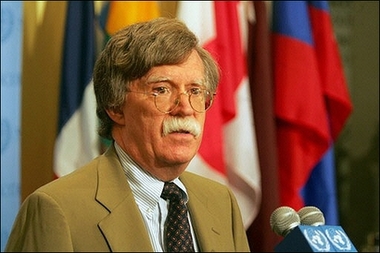Major powers were at odds on Wednesday on how to make legally binding demands
that Iran suspend uranium enrichment and stop work on a reactor that can produce
plutonium, U.S. Ambassador John Bolton said.

US ambassador to the
United Nations John Bolton. The Security Council stalled on calling for a
halt to Israel's deadly strikes against Hezbollah in Lebanon, as it mulled
a lasting solution centered on the disarming of the militant Lebanese
militia.[AFP] |
In informal talks, Russia and China raised questions about a U.N. Security
Council resolution that Western nations want adopted. Their concerns were
similar to disputes over a North Korea resolution last week on how to make their
demands mandatory, participants at the closed-door talks said.
"The good news is everybody had instructions," Bolton told reporters. "The
bad news is they didn't all agree.
Bolton said that while there was agreement to make mandatory the suspension
of uranium enrichment "what we have not reached agreement on is the precise
formulation of the words that will do that."
The draft under consideration is an updated version of one introduced by the
United States, Britain and France in early May but never adopted. It includes
threats of sanctions to curb Iran's nuclear program, which the West fears is a
prelude to bomb-making.
The text will also set a date, not yet determined but possibly by the end of
August, for Iran to comply.
The meetings, which resume on Thursday, included Germany and the five
Security Council members with veto power -- the United States, Britain, France,
Russia and China, the main negotiators on Iran.
At a July 12 meeting in Paris, all six countries agreed Iran had given no
indication it would engage seriously on a commercial and technological incentive
package offered to Tehran if it were willing to suspend its nuclear programs.
The six also agreed to adopt a Security Council resolution that would make
the suspension mandatory.
If Iran still refused, they said then, "We will work for adoption of measures
under Article 41 of Chapter 7 of the U.N. Charter," which calls for sanctions.
To Germany's U.N. Ambassador Thomas Matussek, this meant using Chapter 7 in
the current and any follow-up resolution, he said on Wednesday.
Russia's U.N. Ambassador Vitaly Churkin refused to comment on Chapter 7 on
Wednesday but said, "There must be no misunderstanding about the seriousness of
the international community ... and the seriousness of the need to dispel all
doubts about the nature of the Iranian nuclear program."
During the debate over North Korea's missile launches last week, China forced
council members to work around Chapter 7 and other language and changing words,
such as "decide," to "require."
Chapter 7 makes a resolution legally binding while the North Korean
resolution, according to some experts, was politically but not legally binding.
Chapter 7 also provides for military action as well as sanctions, providing a
specific resolution is adopted to that end. Recalling the invasion of Iraq,
China and Russia fear the United States and its allies would enforce the
resolution without council authorization.
Tehran, which maintains its program is to produce energy only, has shown no
sign of suspending its nuclear work and said it would not reply to the incentive
offer until August 22.
Iran is building a heavy-water nuclear reactor at Arak, 120 miles (190 km)
southwest of Tehran. Western nations are concerned the plant's plutonium
by-product could be used to produce nuclear warheads.
Spent fuel can be processed to extract weapons-grade plutonium. The plutonium
can also be mixed with enriched uranium to produce fuel for a special type of
nuclear reactor.